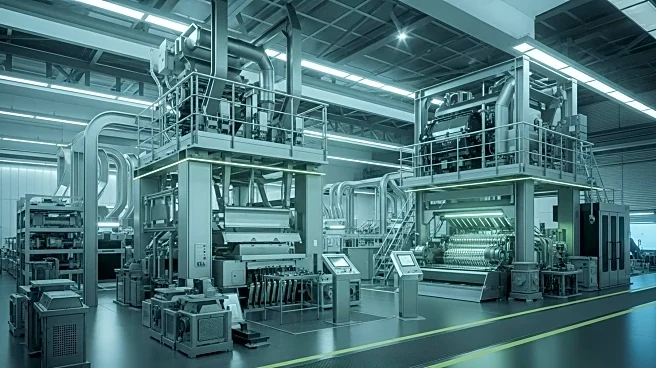What's Happening?
GPH Ispat Limited has set a new benchmark in Bangladesh's steel industry by adopting the Quantum Electric Arc Furnace (Q-EAF) technology to produce environmentally friendly rebar. This innovation significantly reduces carbon emissions and energy use in steel production, a sector known for its high carbon footprint. By recycling scrap metal, GPH Ispat has reduced carbon emissions by 1.67 tonnes per tonne of steel produced. The advanced manufacturing process has also cut natural gas and electricity consumption by up to 50%. The plant, located in Sitakunda, Chattogram, has an annual production capacity of 10 lakh tonnes and exports steel to China.
Why It's Important?
GPH Ispat's adoption of Q-EAF technology represents a significant step towards sustainable industrial practices in Bangladesh. The reduction in carbon emissions and energy consumption aligns with global efforts to combat climate change. As the first installation of this technology in Asia, GPH Ispat sets a precedent for other steel manufacturers in the region. The company's initiatives in rainwater harvesting, reforestation, and renewable energy further contribute to environmental conservation and resource efficiency. These efforts not only enhance the company's reputation but also position Bangladesh as a leader in green steel production.
What's Next?
GPH Ispat's continued investment in sustainable practices may inspire other companies in the steel industry to adopt similar technologies. The company's success in exporting steel to China could open new markets and opportunities for growth. Stakeholders, including government agencies and environmental groups, may collaborate to promote green technology adoption across industries. GPH Ispat's initiatives could also influence policy discussions on industrial sustainability and climate responsibility.
Beyond the Headlines
The shift towards green steel production has broader implications for Bangladesh's economy and environmental policies. It highlights the potential for industrial innovation to drive economic growth while addressing environmental challenges. GPH Ispat's efforts may contribute to a cultural shift towards sustainability, influencing consumer preferences and corporate strategies.











